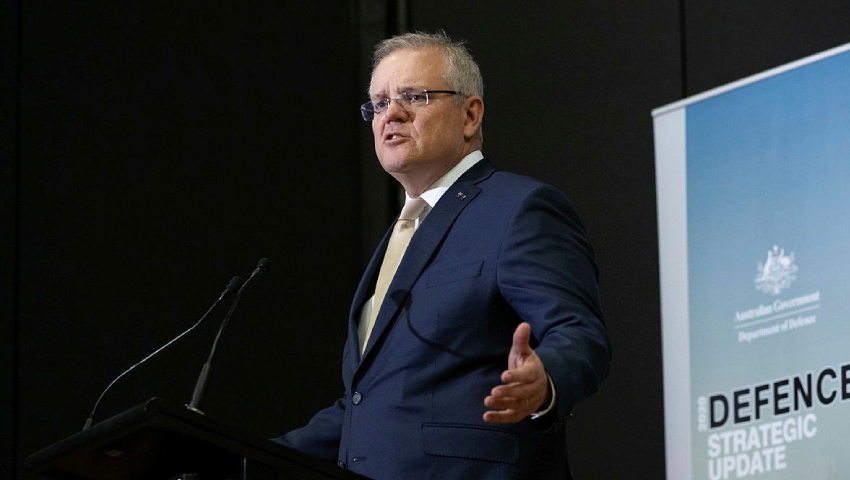Australia’s historic trilateral security partnership with the UK and the US should be the catalyst for a major defence policy overhaul, according to ASPI’s Malcolm Davis.
To continue reading the rest of this article, please log in.
Create free account to get unlimited news articles and more!
The landmark deal, which will see nuclear-powered submarines built in Adelaide as part of a knowledge-sharing arrangement, turns a new page in Australia’s defence playbook.
The deal cements defence ties with Australia’s oldest allies, paving the way for a ramp up in the United Kingdom and the United States’ presence in the region, and a long-term procurement strategy that leverages the technology know-how of members to develop cutting-edge military capability.
But according to Malcolm Davis, senior analyst at the Australian Strategic Policy Institute (ASPI), the agreement should “shake-up” Australia’s defence strategy, which should be adjusted in accordance with the new geostrategic environment.
Davis calls for the development of a new white paper or an AUKUS strategy document, which challenges “orthodox thinking” on defence policy.
“It must not perpetuate the strategic disconnect between our recognition of a dangerous challenge from China and a seemingly steady-as-she-goes approach to capability acquisition,” he writes.
“We can’t cruise on autopilot into an ever more perilous future, and AUKUS represents the first real shake-up to the status quo mindset apparent in the Defence Department’s approach to capability development.”
“Our defence policy will need to be reshaped to emphasise the imperative for the Australian Defence Force to project power and presence well forward in an operational sense.”
Among the new principles outlined in a prospective white paper, Davis adds, is the abandonment of the “middle power” mentality.
“The ADF’s growing military capabilities are driving Australia to a new level of political and strategic influence, and AUKUS will drive this transformation further and faster in coming years,” he notes.
“We shouldn’t be constrained by yesterday’s thinking on our regional standing.”
Davis claims AUKUS has marked Australia’s membership of an “elite club of nations”, with a future fleet of nuclear-powered submarines providing the Royal Australian Navy with “greater strategic reach, speed and endurance, and a greater ability to respond to challenges”.
According to the ASPI analyst, the AUKUS partnership should signal a shift in mindset, which places more emphasis on procuring best-in-class military capability “as soon as possible”.
“It should not be seen as a jobs program. Local production can eventually be the goal, but it should not be a driving factor,” Davis observes.
As such, Davis backs a move to acquire the first tranche of either Astute Class or Virginia Class vessels from an existing production line.
“Planning for an in-service date in the mid-2030s makes little sense when the most serious challenges to Australia’s security will likely occur in the 2020s,” he continues.
He warns that once delivered, Defence should avoid the temptation to “Australianise” the fleet.
Davis also expresses support for a leasing arrangement, which allows Australian crews to operate an existing submarine as part of a mixed crew with US and UK personnel.
“Training arrangements will need to be established quickly to ensure that the RAN, and the civilian defence workforce, can support the eventual introduction of SSNs into Australian service,” he writes.
This will be in addition to the Collins Class fleet — which will continue to operate as part of an expanded life-of-type extension (LOTE) — and a bolstered fleet of US and UK vessels operating in the region.
Davis goes on to tout the benefits of the broader knowledge-sharing deal, which could accelerate Australia’s robotics, autonomous systems and artificial intelligence (RAS-AI) strategy.
This, he adds, could include the procurement of large unmanned underwater vehicles such as Boeing’s Orca.
“Waiting until the late 2030s before acquiring such highly capable platforms, even as the US Navy and Royal Navy plan on deploying them in this decade, would be nonsensical when we face both strategic challenges and challenges in maintaining an effective undersea warfare capability during the transition to SSNs,” he notes.
“If the RAN is to introduce UUVs, it should be in the next few years. Ultimately, large UUVs will likely replace the Collins and operate alongside, but independently of, Australia’s SSNs.”
The acceleration of defence procurement should be coupled with a broader effort to solidify ties with regional neighbours, Davis adds, particularly Japan, South Korea, Indonesia, and India.
“The Quad and ASEAN need to be assured of AUKUS’s benefits and our commitment to working with them in the region,” he writes.
“This won’t be simple or quick, given that the perception in many ASEAN capitals will be that AUKUS reinforces an Australian and American attitude that’s dismissive of ASEAN centrality and non-alignment.”
Davis concludes by noting the importance of rebuilding the diplomatic relationship with France, fractured by the scrapping of Naval Group’s SEA 1000 contract.
“The skills of the foreign minister and her department will be put to the test,” Davis writes.
Get involved with the discussion and let us know your thoughts on Australia’s future role and position in the Indo-Pacific region and what you would like to see from Australia's political leaders in terms of partisan and bipartisan agenda setting in the comments section below, or get in touch with
Charbel Kadib
News Editor – Defence and Security, Momentum Media
Prior to joining the defence and aerospace team in 2020, Charbel was news editor of The Adviser and Mortgage Business, where he covered developments in the banking and financial services sector for three years. Charbel has a keen interest in geopolitics and international relations, graduating from the University of Notre Dame with a double major in politics and journalism. Charbel has also completed internships with The Australian Department of Communications and the Arts and public relations agency Fifty Acres.

 Login
Login








